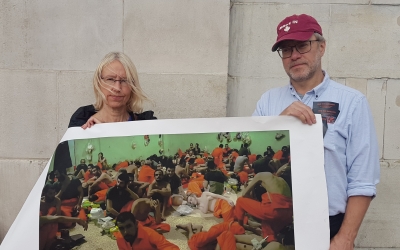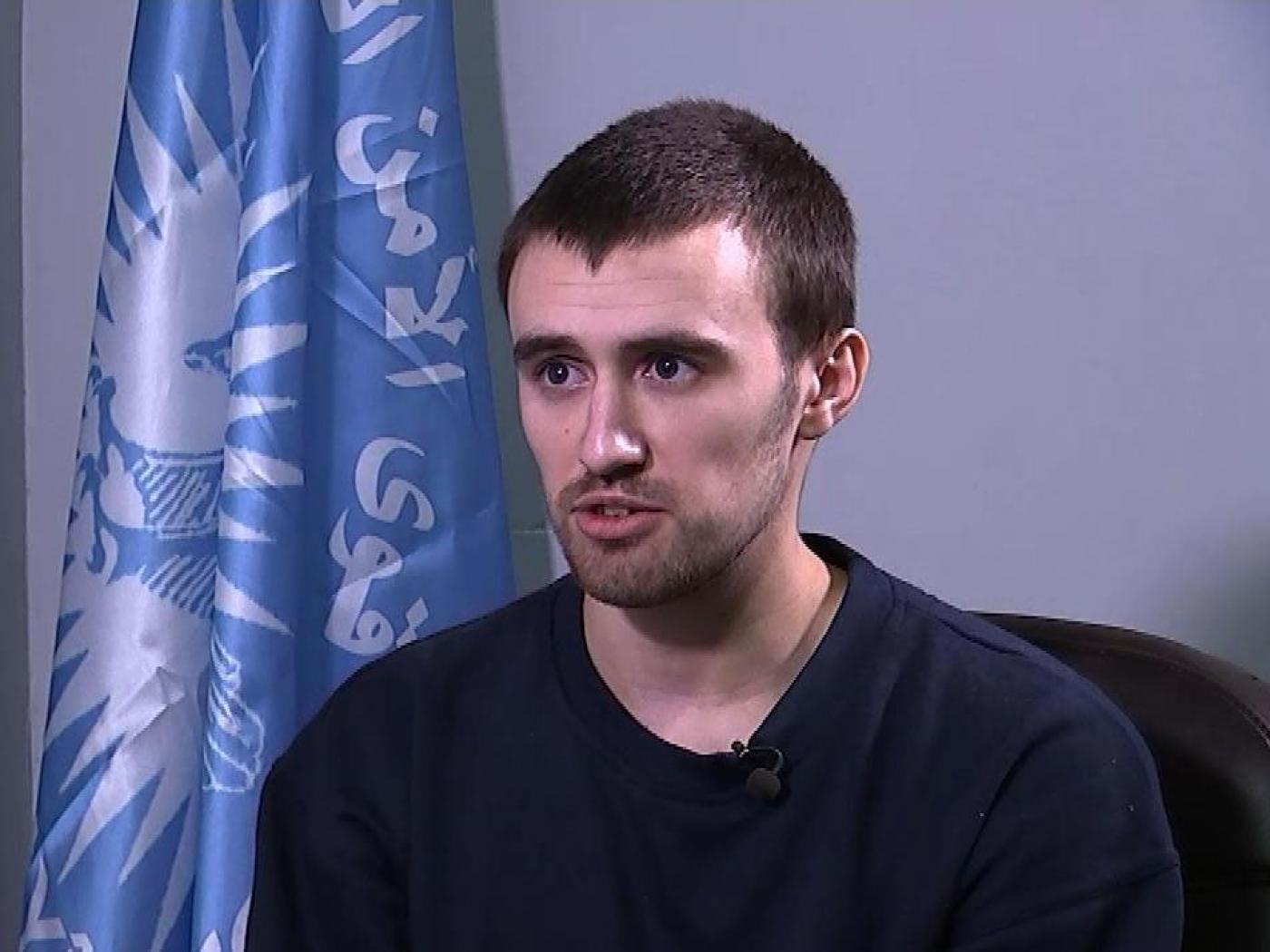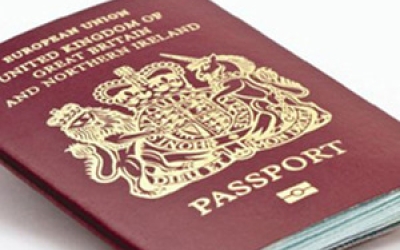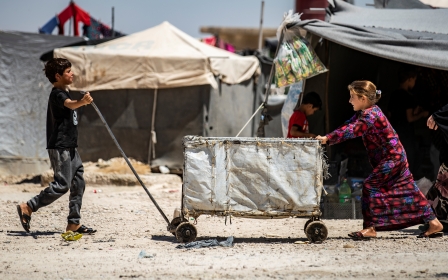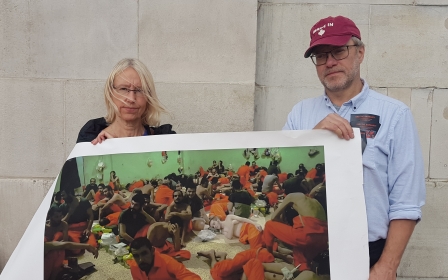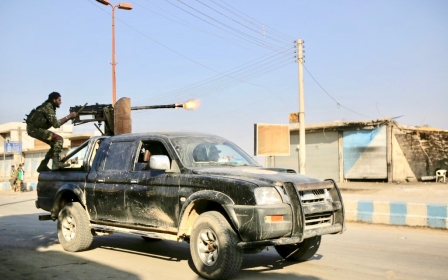REVEALED: Boris Johnson ignored Jack Letts torture concerns because 'no public sympathy'
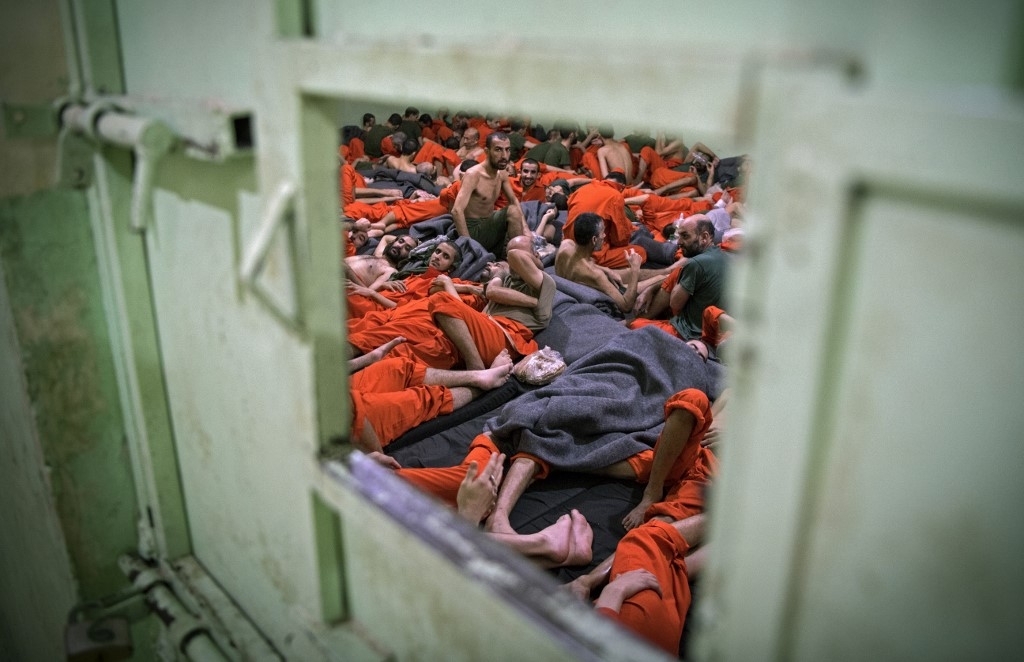
The UK foreign office drew up plans to assist a British man held among suspected Islamic State group fighters in Syria, in order to save him from alleged torture, but chose not to act after Boris Johnson was briefed that there was no public sympathy for his predicament.
Officials considered offering help to Jack Letts in July 2017 after his parents had raised concerns that he could die as a consequence of alleged mistreatment by his Kurdish captors, according to a partially redacted Foreign Office memo seen by Middle East Eye.
But Johnson, who was foreign secretary at the time and is now prime minister, opted to stick to the government's policy of telling Letts’ parents that it could not help anybody in Syria because the UK did not have any consular services in the country.
Clive Stafford Smith, a human rights lawyer, told MEE that the case raised concerns about the government's commitment to human rights and the rule of law under Johnson, whose Conservative party gained a majority in last week's election.
“The truth is that whether someone is going to get justice or their right to consular support in Britain was indeed relegated to a media popularity contest under Boris Johnson as foreign secretary,” said Stafford Smith.
“That is very sad in a country that purports to promote the rule of law.”
The memo, dated 19 July 2017, was drafted shortly after John Letts and Sally Lane had met Foreign Office officials to discuss their son’s case and told them that he had been “subject to electrocution” and was confined to his prison cell for up to 23 hours a day.
They also told them that they believed British officials were in contact with Kurdish officials and were passing questions to them to ask Letts.
'Standard lines'
The memo shows that officials considered offering Letts assistance and drew up potential options in response to the allegations of mistreatment.
It is unclear whether these proposals included taking steps to repatriate Letts to the UK, as his parents had requested, as one of the three options is completely redacted.
Another option suggests that British officials could “explore the option of Mr Letts seeking assistance from EU partners who may have consular presence in Syria”.
The final option was to repeat the “standard lines” that Letts “could seek consular assistance should he present himself in a neighbouring country”.
In considering the risks posed by this option, the memo noted: “The parents have stated that there is a possibility their son may die given his reported treatment. They have also indicated that he may self-harm or commit suicide.”
It also noted that John Letts had said that a media campaign highlighting the government's inactivity was a possibility.
But it concluded: “Currently, press coverage and public opinion is not sympathetic to the Letts family or Mr Letts' predicament.”
Other memos in a batch of Foreign Office documents suggest that an official prepared for a meeting with Letts’ parents in June 2017 by seeking advice on what the government’s line was in relation to its obligations under human rights law, and how to balance its obligations on mistreatment with the policy of not providing assistance.
The official also noted that a colleague was “trying to get a form of words” to address the allegation that the government was “feeding questions to those holding him”.
A later memo regarding a further meeting between Foreign Office officials and John Letts revealed that British officials had made a number of visits to Kurdish-controlled Kobane and Jarabulus in northern Syria, though it acknowledged that the prison in Qamishli where Letts was being held was at least 200 miles away from those locations.
The concerns about mistreatment raised by Letts’ parents were based on messages he had sent them in which he said he had been tortured and threatened with being “put in a box”.
In a subsequent phone call to a Canadian diplomat after the allegations of mistreatment had been raised by journalists with Kurdish officials, Letts said he had been held in a two-metre by one-metre cell for 35 days.
Kurdish officials said in 2017 that Letts, a Muslim convert who travelled into IS-held territory in Iraq and Syria aged 18 in 2014, was being treated in accordance with international human rights standards and described the allegations of torture as "baseless".
They said he was under investigation on charges of being an IS member. Letts' parents say there is no evidence that he is a fighter. They say he was imprisoned by IS and also spent much of his time in Syria in hiding before escaping from territory controlled by the militant group in 2017.
'Legal limbo'
But the memos seen by MEE appear to raise fresh questions about the UK government's longstanding unwillingness, alongside other western nations, to repatriate its own citizens, including many children, who were swept up by internationally backed Kurdish forces as they captured territory previously held by IS in 2017 and 2018.
The UK last month repatriated a small number of orphaned children but Home Office officials said afterwards that future repatriations would be looked at on a case-by-case basis and even children would be treated as potential security risks.
Boris Johnson said: “I think it would be over-optimistic to say that we could do it in every single case - the military, logistical difficulties involved are very considerable, but what I’ve said is that where the government can help then it should help.”
'Do the right thing and bring them back'
- Sally Lane, Jack Letts' mother
Sally Lane told MEE that she and her husband had not been in contact with the Foreign Office since October 2018 but urged the new government to “do the right thing and bring them back”.
“Britain is supposed to stand for the rule of law. Keeping people in legal limbo just makes a pretence of the entire British pseudo-democratic system. The prisoners are political hostages and are being used as bargaining chips by all sides and the hypocrisy stinks,” said Lane.
Letts, who also holds Canadian citizenship through his parents, is among dozens of British dual-nationals who were last year stripped of their citizenship on national security grounds in another move for which the government has been criticised by human rights campaigners.
The UK and citizenship-stripping powers
+ Show - HideThe UK has been described by researchers as a “global leader in using citizenship deprivation as a counterterrorism measure”.
Historic citizenship-stripping powers targeted at naturalised citizens on disloyalty grounds had largely fallen into disuse prior to 2002, when the government introduced new measures in an attempt to revoke the citizenship of Abu Hamza, an Egyptian-born cleric subsequently convicted of terrorism in the US.
The 2002 legislation allowed for British-born nationals as well as naturalised citizens to lose their nationality rights. Successive governments gradually broadened the scope of the powers so that home secretaries can now deprive anyone of citizenship if they are satisfied that doing so is “conducive to the public good” and would not leave an individual stateless.
No criminal conviction is required. Letters often state that individuals have been assessed as presenting “a risk to the national security of the United Kingdom”.
The government’s use of the powers surged to unprecedented levels in response to the perceived threat posed by British nationals returning from Syria.
Between 2010 and 2015, 33 people were stripped of their citizenship, according to Home Office figures. In 2016, 14 people were deprived, and in 2017 the number jumped to 104.
In 2018, the figure was 21, and in in 2019 - when Shamima Begum was among those targeted - it was 27. It then dropped to ten in 2020 and eight in 2021.
Some subjects of citizenship-stripping orders argue that they have been left effectively stateless, because the government bases its assessment that they are dual nationals on a right of citizenship to a parent’s country of birth, even if they have never taken up that citizenship or even visited the country.
In some cases the Special Immigration Appeals Commission, which rules on citizenship cases, has agreed: it has ruled in favour of British nationals of Bangladeshi descent on the grounds that Bangladesh does not consider them citizens if they have not claimed Bangladeshi nationality before the age of 21.
Human rights organisations and lawyers have compared the powers to “medieval exile and banishment”. Critics also point out that the powers create a two-tier system in which only those deemed to be dual nationals are at risk of losing their British citizenship; a measure that discriminates against naturalised citizens, immigrants and their children.
Letts' parents also sought help from Canada but they say Canadian interest waned, they believe, as a consequence of British pressure.
In August, Canadian Public Safety Minister Ralph Goodale said Ottawa was “disappointed that the United Kingdom has taken this unilateral action to off-load their responsibilities”, referring to Letts being deprived of his British citizenship.
But Canada has also been reluctant to repatriate its nationals from Syria. On Monday, Canadian Prime Minister Justin Trudeau said it was too dangerous to send Canadian diplomats to collect a four-year-old orphan currently detained at the Kurdish-run al-Hol detention camp.
Meanwhile, Turkey’s attack on Kurdish forces in north-eastern Syria and the retreat of US forces previously working alongside the Kurds has only made the situation more precarious, with the Kurds cutting a deal with Damascus that has seen Syrian army and Russian forces return to the region - and the prospect of the detainees being handed over to the Syrian government.
'Hostile environment'
Stafford Smith urged Johnson to reconsider the government's policy on returnees, pointing out that around 60 British children were among the detainees, and that countries which had shown the will to do so had been able to repatriate their nationals.
“If Mr Johnson wants his legacy to be hatred and Islamophobia, so be it. If he wants to join the world of human rights, he needs to take a long, hard look at the barbaric policy his government has been pursuing for months and years,” he said.
Hanif Qadir, a former government-backed counter-extremism practitioner who had contact with Jack Letts in 2016 with Home Office and police authorisation, told MEE that his case and those of others now deprived of citizenship and effectively stranded in Syria highlighted a failure of policy.
'If Mr Johnson wants his legacy to be hatred and Islamophobia, so be it'
- Clive Stafford Smith, human rights lawyer
“The problem is mainly now that the government has created a hostile environment where there is a complete disregard for the human rights of individuals who have travelled abroad irrespective of their age, and whether they were minors or young people,” said Qadir.
Qadir said that the prisoners would face “certain death” if handed over to the Syrian government and said that the government should not “turn a blind eye” to their fate, regardless of whatever they may have been alleged to have done.
“If they do that, what they are doing is effectively confirming a narrative that if you are a Muslim you are going to be disregarded and your human rights amount to nothing."
Detainees should instead be brought home, subjected to judicial process and considered for rehabilitation and deradicalisation schemes in appropriate circumstances, he said.
A Foreign Office spokesperson told MEE that it did not comment on individual cases.
"The safety and security of our country, our people and our communities remains the government’s number one priority," the spokesperson said.
"The UK continues to advise against all travel to Syria, and we remain unable to provide consular support from within Syria. Anyone who travels to Syria for whatever reason is putting themselves in considerable danger."
Middle East Eye propose une couverture et une analyse indépendantes et incomparables du Moyen-Orient, de l’Afrique du Nord et d’autres régions du monde. Pour en savoir plus sur la reprise de ce contenu et les frais qui s’appliquent, veuillez remplir ce formulaire [en anglais]. Pour en savoir plus sur MEE, cliquez ici [en anglais].


